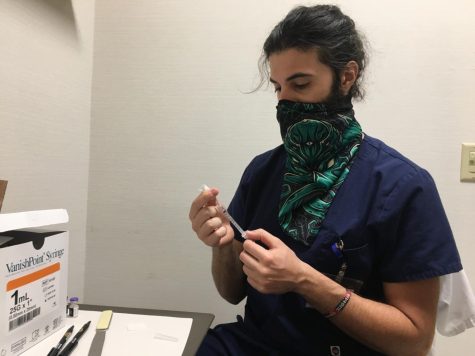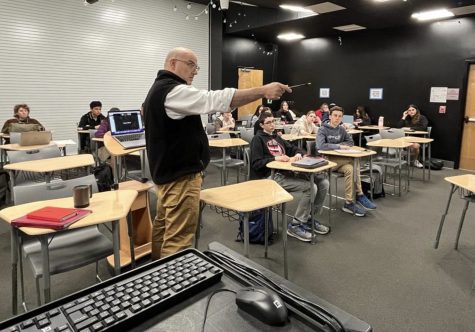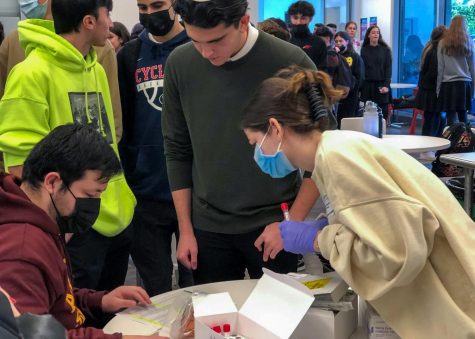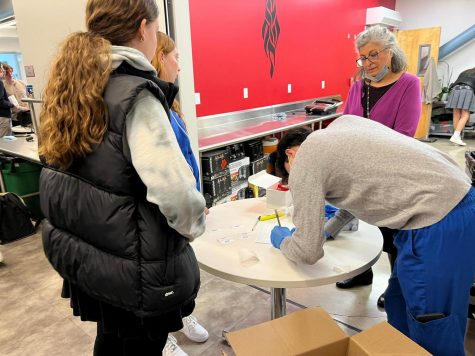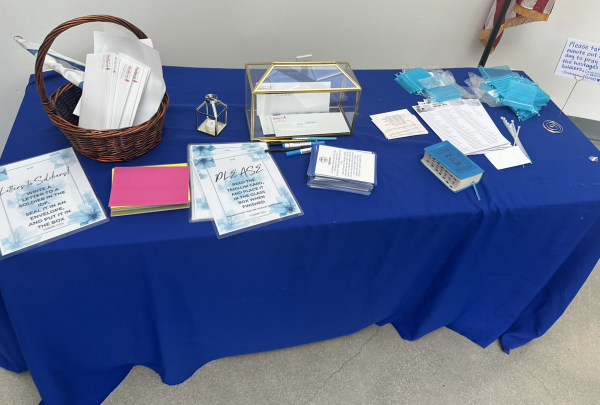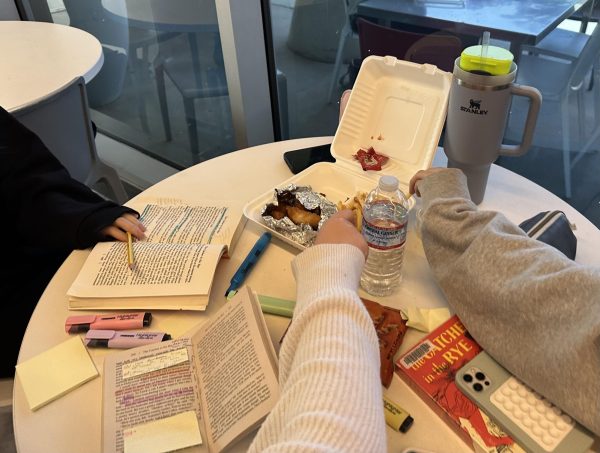With memes and TikToks, teens lighten the mood of ‘corona break’
PERSPECTIVE: Social media has become a platform for fun in the time of Covid, including in the world of Jewish memes.
Earlier this year, social media seemed like the problem, blamed for causing unnecessary panic over the novel coronavirus and the disease it causes, Covid-19.
But now, Generation Z is finding light in the midst of uncertainty by using social media as an outlet to spread laughs and positivity during the pandemic.
There are coronavirus-related TikToks, music videos and memes. Teenagers have been referring to the extended time out of physical school as “corona break” or even “Rona break” for short.
On Instagram, the hashtag #coronamemes has over 1.2 million posts, filled with memes and screenshots of funny Tweets. One popular meme page, under the username @daquan, imagines a theoretical virtual graduation with avatars, so seniors would have to use their computer to graduate online.
“Seniors finna be out here graduating electronically ‘click to walk across the stage,’” the meme says — with laughing emojis.
Comments include “How you gonna buffer your own graduation” and “‘selecter printer for diploma.’”
Memes are not the only way to spread smiles over social media. Videos of Italian and Spanish citizens singing with their neighborhoods from their balconies while in quarantine have been going viral on social media platforms.

RELATABLE: This Tweet incorporates an internet favorite: dog memes.
One video features a group of apartment buildings in Sicily with people popping out of windows and huddled on balconies, all contributing to a lively chorus whether it be through singing along or playing an instrument to the beat of the song.
The caption of the video is “sicily has figured out this whole self-isolation thing.” Comments include “they be vibin doe” and “oh to be Italian in quarantine.”
Instagram “challenges” have also been going viral. Some challenge viewers to draw pictures, do push-ups or solve riddles.
Others are meant to innocently trick people rather than accomplish an exercise or art challenge. For the “Until tomorrow” challenge, people must post an embarrassing picture of themselves on their Instagram account and leave it up until the next day. The picture has only the caption “Until tomorrow,” which confuses viewers of the post who may think it’s some kind of farewell.
The poster must message everyone who likes their picture saying:
“So… you liked my post so you have to post an embarrassing picture of yourself, you’re ONLY allowed to write ‘until tomorrow’ and you can only tag me. You must send this message to everyone who has liked your picture. The picture must stay posted for 24 hours. Good luck and don’t spoil the game!”
Teens are also using their favorite platforms to stay in touch with friends during this period of otherwise loneliness.
Shalhevet junior Samson Taxon says that he has been able to talk to people he does not normally talk to during the time off.
“I feel like I am talking to more people less directly,” said Samson. “People I wouldn’t necessarily talk to at school, I am texting. I feel like now people are more eager to interact, so any preexisting stigma about people goes away. I have noticed that dead group chats are coming back to life.”
Senior Alyssa Wallack says she is especially grateful to social media, something that has been criticized by older generations, for allowing her to stay connected.
“Without social media in this day and age, it would be nearly impossible to keep in touch with so many of my close friends,” said Alyssa in an interview via text message.
Content on the video-making app TikTok, where people can share dance videos, comedy skits and more, generally becomes popular when many users are able to relate to the topic.
It follows that since almost every teenager on the app has transitioned to a life of online school and quarantine, the app has been flooded with comedy videos relating to the reason.
One features a girl standing in her front yard with the caption: “Me doing the fire drill from home because of the coronavirus.”
Many users have recreated variations of a group video-chat titled, “Class of 2020 Graduation,” with each member of the video chat pretending to hold a virtual graduation and pretending to collect a diploma — all while on a video call.
Comments on such videos include “THIS IS SO SAD BUT SO FUNNY,” and “Imagine going to school for 12 years and this happens.”
Shalhevet senior Rachel Metzger said that group chat is meeting a widespread need.
“It’s really nice that we are all able to connect over this, especially for seniors,” said senior Rachel. “There’s a lot of content for seniors who aren’t gonna be having graduation and all of the classic senior activities. It’s comforting to be surrounded by memes and videos on social media that express the same feelings that I have.”
Others feel conflicted about laughing, considering what’s behind these memes.
“I do laugh, but then again I always know that the coronavirus is a real thing and people are suffering and dying from it,” said Daniel. “So maybe it’s not always something we should laugh about because it’s not always humorous, but sometimes they are humorous.
“But also the coronavirus memes, it made it feel like the situation was much more normal,” he added.
The coronavirus TikTok trend also has made its way into the world of Jewish TikToks.
One girl made a tear-jerking video with the caption, “I’m supposed to go to Israel this summer. It will most likely be cancelled due to Covid-19. I have been looking forward to this trip my whole life. Here is what I’m going to miss,” followed by a montage of picturesque images of Israel.
Other users relate and try to spread hope, commenting, “same I’m going to Poland and Israel hopefully everything works out.”
Another commented, “I’m in Israel and all these comments literally make me so emotional. So happy to see people love this country and want to visit here.”
The term corona break is also gaining popularity on TikTok. This term is what teenagers are jokingly using to refer to their time off from school during the pandemic.
The hashtag #coronabreak has 5.3 million views, and includes videos of teenagers showing how they’re spending their out-of-the-building class days.
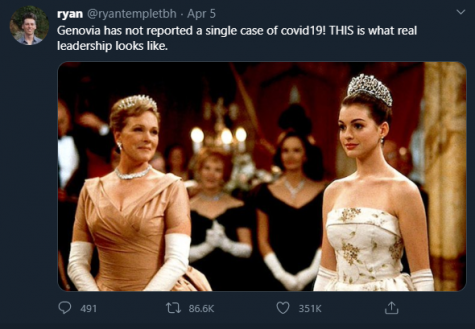
HEALTHY: A Tweet pokes fun at the uncontainable spread of the coronavirus by declaring that the only case-free country is the fictional nation of Genovia.
Popular videos feature teenas baking, dancing, showing off their outfits and more. Others complain that their parents won’t let them out of the house — a topic which has gained popularity due to the universality of this experience.
In the Jewish world Boaz Harlow Siegel, a 14-year-old eighth-grader at New York’s SAR Academy whose Youtube channel name is The Fiddlerrockstar, created a comical music video titled “Covid-19 Quarentine [Official Video]”
Boaz, who’s a cousin of Shalhevet senior Kelly Ciment, wrote and recorded an upbeat and humorous song and published it way back on March 6, when New Rochelle, N.Y., was the only quarantined city in the U.S.
His video has more than 7.300 views on Youtube, and pokes fun at life in quarantine from a distinctly Jewish perspective.
Stop kissing the Torah, mezuzah and siddurim,
Stop dancing the hora and don’t get me started on Purim,
Megillah live-streamed, Purim carnival cancelled
We don’t give shalach manos because we all can’t handle
The crazy stress of not leaving the house
You think you’re missing school but remote learning comes out
It’s a recipe to go stir-crazy
When all you can do is rest and be lazy.
In an interview with the Boiling Point, Boaz said he made the video to spread some positivity.
“My parents and relatives and a lot of my classmates were also quarantined, and they each individually told me almost jokingly that I should write a song about it,” said Boaz.
“I knew that there were over a thousand people like me who were quarantined too, and I really wanted to give them something that would cheer them up in case they were scared or bored in this unfortunate situation.”
Not all of teen social media is created with humor in mind. Another Jewish teenager — Avi Schiffman of Seattle, age 17, created a comprehensive website that tracks coronavirus cases, including how serious they are, everywhere.
The website, ncov 2019.live, details recoveries, deaths and case confirmations from every country in the world.
The universality of a pandemic, albeit unfortunate, naturally creates a world-wide “inside” joke — pun intended. In a time that is scary and unfamiliar, humanity is drawn to the familiar — and for a lot of teens, that means memes.
Freshman Daniel Kunin sees both sides of the issue, and is able to appreciate the humor while still taking the pandemic seriously.
“I do laugh,” said Daniel, “but then again I always know that the coronavirus is a real thing and people are suffering and dying from it, so maybe it’s not always something we should laugh about because it’s not always humorous, but sometimes they are humorous.”
Arts and Culture Editor Jolie Wineburgh contributed to this story.

Kate Orlanski joined the Boiling Point as a staff writer during her freshman year and now serves as Features editor during her junior year. Outside of journalism, she is co-chair of the Young Americans for Freedom club, a member of the Model Congress team and secretary of the Agenda Committee.



